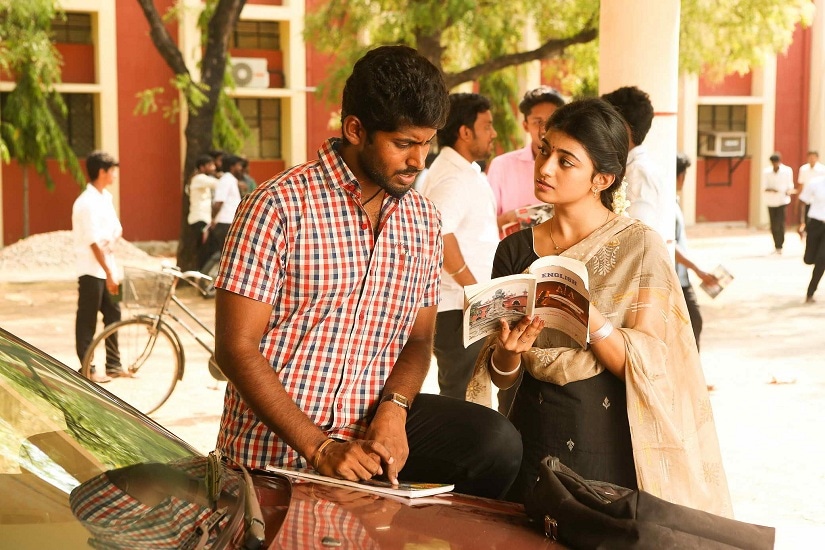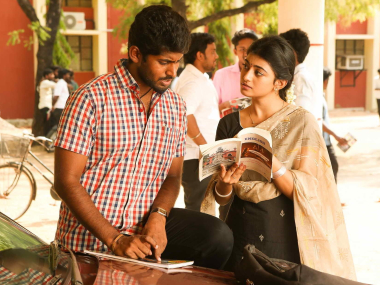The movie Pariyerum Perumal BA.BL, directed by Mari Selvaraj, has been widely debated for its explicit discussions on caste since its release on 29 September. In particular, the director has depicted various familiar forms of caste violence inflicted on Dalits. The story revolves around a college student, Pariyen, who faces difficulty in understanding English. To cope with the language better, he takes help from his classmate Jo (Jothi Mahalakshmi). Soon, both of them become friends. However, Jo’s father and her cousin regard their relationship suspiciously and unleash physical and mental violence on Pariyen to keep him away from Jo. The rest of the story narrates what happens to their friendship and how Pariyen responds to these circumstances. The movie was well received by critics and the public alike. Initially, the movie released in very few theatres as many were reluctant to screen it. It was following widespread popular demand for the film that more theatres started screening Pariyerum Perumal. Such reluctance on the part of theatre owners is, however, nothing new. In the recent past, the movie Shudra the Rising faced the same problem, as did even Dr Babasaheb Ambedkar, when it was released in 2000. Theatres were initially reluctant to screen the movie, until the Dalit movement ‘hired’ the movie and took it to theatres. [caption id=“attachment_5369901” align=“alignnone” width=“825”]  Still from Pariyerum Perumal[/caption] Such discriminatory behaviour is not restricted to the movie industry alone; even shops are reluctant to sell anything that’s branded outright as Dalit. The editor of Dalit Murasu weekly recalls how distributors of Tamil weeklies refused to take the magazine to stores. Though Dalit Murasu laid the foundations for several noted journalists’ careers, the magazine can be found neither in the public library nor in stores. As a matter of fact, several subscribers, including Dalit officials, categorically requested that the magazine should not be sent to their office as their fellow colleagues would then identify him/her as Dalit. Similarly, the only reason the distributor had against taking the book to stores was that shop owners would not prefer to keep a magazine that had ‘Dalit’ in its title.
Such experiences repeatedly expose that the public sphere has always been a space against Dalits.
Mari Selvaraj captures various such instances of everyday discrimination in his film: In a bus, an old caste Hindu man prefers to stand, rather than to sit next to a Dalit. Another scene reveals how seating in a classroom is also invisibly marked by/with caste. A Dalit is murdered for swimming in a public pond. A police officer, who is the custodian of the law, is shown holding on to his caste pride and humiliating Dalits who question him. Most importantly, the railway track is central to the movie — shown as a weapon to murder Dalits with and as a site of suicide for upper castes. The railway track is evoked twice in the movie, through which the director evokes Ilavarasan’s death. Ilavarasan and Divya were the central figures in the infamous love story between a Paraiyar boy and a Vanniyar girl which had captured widespread attention in Tamil Nadu. The love story came to an abrupt and gruesome end, when Ilavarasan was allegedly murdered on a railway track. A powerful scene in the movie is reminiscent of Ilavarasan’s murder. In the movie, Jo’s father explains that if his caste people know of the relationship, they will kill her and the family. There are couple of scenes reiterating the same information. Such scenes in the movie problematise the relationship between caste and the family; the movie portrays it as a complex problem that goes beyond family to caste members who largely hold control over caste.
Like in the caste system, even in the movie, women do not have any agency.
In the caste system, occupational roles are assigned only to men belonging to the upper castes. Only Brahmin men are priests, Kshatryia men are warriors, Vaishya men are merchants and Shudra men are labourers. However, this gender disparity disappears only among the athishudra or the untouchables — here, both men and women are assigned menial labour. In the caste system, there is not independent role for women. Likewise, women lack any sense of autonomy or agency within the movie as well. Jo is reduced to a state of unquestioning innocence, to the state of a woman who does not even know about caste conflict. Nevertheless, it shows that as a caste Hindu woman, Jo at least has the privilege to tell her father what she feels about Pariyan. On the other hand, Pariyan is not allowed to speak his mind all through the movie. However, such innocent and naive characterisation of caste Hindu women (particularly those in inter-caste relationships) undervalues the sacrifices made by such women who have stood by their Dalit husbands after leaving behind everything they cherished. One should remember Kausalya whose husband Shankar, a Dalit man, was murdered by her father at Udumalaipet in Tamil Nadu. She named her father as the culprit and vowed to fight caste till her last breath. Similarly, in Telangana, two caste Hindu women — Madavi and Amrutha — decided to stand steadfastly with their Dalit husbands; the men were hacked to death by their wives’ families. The importance of their sacrifices should be recognised and can never be understated.
As mentioned earlier, within the caste system, there is no gender for untouchables.
Men and women have multiple roles and are addressed by their caste as well as their animal names. In the movie, Karuppi the dog is also considered untouchable as it lives with untouchables. Significantly, Pariyan is himself addressed as dog. It is notable that there are hardly any Dalit women in this movie, even for representational purposes. It is blatant shortcoming, considering that previous movies articulating anti-caste sentiments at least had a symbolic role for Dalit women. Such a portrayal only reaffirms the dominant criticism that the Dalit movement is predominantly male-centric. It is also a trend in movies to portray caste mostly through a love story between a Dalit man and a caste Hindu woman. As a matter of fact, in Tamil Nadu, even a love marriage between different Dalit castes will be violently opposed. Take for instance the story of Gokila and Karthikeyan in Villupuram, which ended with Gokila being allegedly murdered by her own Paraiyar family. When this particularly gruesome affair took place, there was a deep silence from the anti-caste movement. There are many such stories, including my own. When I married a Paraiyar girl, despite a threat to my life as well as my partner’s, I did not receive support from any Paraiyars — and that includes academicians, activists and politicians. As an activist and academician myself, I was able to garner the support of various civil societies, which saved me and Karpagam. However, even while we lived to tell the tale, what about the countless cases where the couple cannot reach out to or get any public support? It is a sad reality that caste arrogance is not only seen among caste Hindus, like the movie portrays, but is deeply ingrained among Dalits themselves. The Scheduled Castes in Tamil Nadu carry their caste pride and discriminate against other SCs. We should move from the simple narration of caste from a Dalits vs non-Dalits perspective in order to complete the annihilation of caste system even among Dalits. A complete annihilation of caste can hardly be envisaged in these popular movies. This leads to my final concluding remark – my complete and utter dissatisfaction and disagreement with the final scene of the film where two tea tumblers are shown at an equal level, almost suggesting that all is well and good in caste society.
Within the caste system, demanding equality is a myth. The sense of equality marked out by the caste Hindu will necessarily differ from what a Dalit demands.
Hence, a complete eradication of caste system is what needs to be demanded. Babasaheb Ambedkar, after trying and testing different methods, understood that a complete annihilation of caste was a must; such a process cannot be done while being a Hindu. He converted to Buddhism stating that while he was born as a Hindu, he will never die as a Hindu. The movie shows caste as a problem with the caste Hindus and does not recognise it as an intrinsic and inalienable part of the Hindu religion itself. Rather, with a tad bit of irony, the movie title itself is evocative of some grandiose Hindu epic — Pariyerum Perumal (a horse-laden deity). To conclude, Pariyerum Perumal is a great movie to watch. However, the movie is neither anti-caste nor casteist. Rather, it merely discusses popular forms of discrimination and evokes memories of some earlier instances of caste violence. The movie eventually tries to find solutions within the caste system itself. Dr Ravichandran Bathran is founder of Dalit Camera, a YouTube channel. He tweets @dalitcamera


)
)
)
)
)
)
)
)
)



